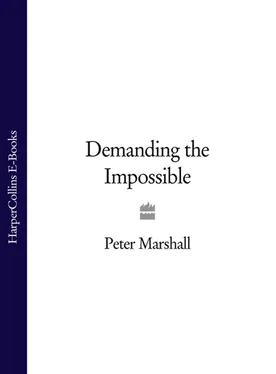Yet despite his centralizing and strengthening of the State and his liquidation of the anarchist opposition, Lenin still firmly believed that the withering away of the State was the final goal of communism. In a lecture on the State, he insisted that while it was necessary to place the machine (or ‘bludgeon’) of the State in the hands of the class that is to overthrow the power of capital, he looked to a time when they ‘shall consign this machine to the scrap heap. Then there will be no state and no exploitation’. 51
Whatever Lenin’s ultimate ideal, his reliance on a vanguard Communist Party to steer the ‘Dictatorship of the Proletariat’ led eventually not only to the dictatorship of the Party but also to the dictatorship of one man – Stalin – in the Soviet Union. Moreover, in the other major Marxist-Leninist revolutions this century, in China, North Korea, Vietnam and Cuba, ‘democratic centralism’ has resulted in practice in highly hierarchical and authoritarian States controlled by an elitist party. The dire warnings of Bakunin that a ‘Workers’ State’ would lead to a new ‘red bourgeoisie’ have been tragically confirmed. The Communist States that have emerged this century amply demonstrate the anarchists’ fear that a ‘People’s State’ or ‘Revolutionary Government’ would not only perpetuate but extend tyranny.
The anarchists like liberals see the State as primarily a legal association and law as its mode of action. 52 It is designed to maintain a compulsory degree of legal order. Its principal bodies – the legislature, judiciary, and executive – are responsible for making, interpreting and enforcing the law. Strictly speaking, a law is a rule of conduct made by government and enforced by the State.
Tolstoy describes laws vividly as ‘rules, made by people who govern by means of organized violence, for non-compliance with which the non-compliant is subjected to blows, to loss of liberty, or even to being murdered’. 53 Laws restrict our liberty by making us act or refrain from acting regardless of our wishes; they stand like high hedges, keeping us on the straight and narrow. The methods used by the State to enforce its laws are those of compulsion: the ultimate power of the law is the coercive power of the State. As Hobbes recognized, the authority of Leviathan is ultimately based on the sword – or its modern equivalent, the policeman’s cosh or the soldier’s gun. Indeed, as Tolstoy observed, the characteristic feature of government is that ‘it claims a moral right to inflict physical penalties, and by its decree to make murder a good action’. 54 Since they reject the State, it is therefore inevitable that anarchists reject its most coercive expression in the law; in the words of Jean Grave, ‘anarchy demonstrates that there cannot be any good laws, nor good governments, nor faithful applications of the law … all human law is arbitrary.’ 55
Of all anarchists, Godwin was the earliest and most trenchant critic of law. In the first place, he argued that man-made law is unnecessary since ‘immutable reason is the true legislator’. Men can do no more than declare and interpret the rules of universal justice as perceived by reason. Secondly, the principal weakness of law is its status as a general rule. No two actions are the same and yet the law absurdly tries to reduce the myriad of human actions to one common measure, and as such operates like Procrustes’ bed in the Greek legend which cuts or stretches whoever lays on it. Thirdly, law is inevitably made in the interest of the lawmakers and as such is a ‘venal compact by which superior tyrants have purchased the countenance and alliance of the inferior’. 56 Above all, like government it fixes the human mind in a stagnant condition and prevents that unceasing progress which is its natural tendency.
Godwin was certain that the punishment – the voluntary infliction of evil on a vicious being – threatened or imposed by law is not an appropriate way to reform human conduct. Since men are products of their environment, they cannot strictly speaking be held responsible for what they do: an assassin is no more guilty of the crime he commits than the dagger he holds. Since they are in the grip of circumstances, they do not have free will. There can therefore be no moral justification in punishment, whether it be for retribution, example or reform. All punishment is ‘a tacit confession of imbecility’; indeed, it is worse than the original crime since it uses force where rational persuasion is enough. Coercion cannot convince or create respect; it can only sour the mind and alienate the person against whom it is used.
Godwin was convinced that law, like government, is not only harmful but unnecessary. His remedy for anti-social acts was to reduce the occasion for crime by eradicating its causes in government and accumulated property and by encouraging people through education to think in terms of the general good rather than private interest. Since vice is principally error, enlightenment will be enough to make people virtuous.
Godwin is realistic enough to recognize that even in a free society it may be necessary to restrain violent people on a temporary basis, but they should always be treated kindly and kept within the community as far as possible. Instead of resorting to courts and professional lawyers, disputes could be solved by popular juries who consider the specific circumstances of each case: ‘There is no maxim more clear than this, “Every case is a rule to itself”.’ 57 The aim should always be to resolve conflict rather than apportion blame. Eventually, Godwin believed, it would only be necessary to recommend rather than enforce the decisions of juries. In place of law, the power of public opinion would suffice to check anti-social acts. And once the ‘rules of justice’ were properly understood by the community, then laws would become unnecessary.
After Godwin, Kropotkin offered the most cogent anarchist criticism of the law. All legislation within the State, he asserted, has always been made with regard to the interests of the privileged classes. He traced the origins of law first to primitive superstitions, and then to the decrees of conquerors. Originally human relations were regulated by customs and usages, but the dominant minority used law to make immutable those customs which were to their advantage. Law thus made its appearance ‘under the sanction of the priest, and the warrior’s club was placed at its service’. 58
Kropotkin divided the millions of laws which exist to regulate humanity into three main categories: the protection of property, the protection of governments, the protection of persons. The first is intended to appropriate the product of the worker’s labour or to deal with quarrels between monopolists; as such they have no other object than to protect the unjust appropriation of human labour. The second category, constitutional law, is intended to maintain the administrative machine which almost entirely serves to protect the interests of the possessing classes. The third category, the protection of persons, is the most important since such laws are considered indispensable to the maintenance of security in European societies. These laws developed from the nucleus of customs which were useful to human communities, but since they have been adopted by rulers to sanctify their domination they have become as useless and injurious as the other categories of law.
Kropotkin argued that the main supports for crime are idleness, law and authority. But since about two-thirds of existing crimes are crimes against property, ‘they will disappear, or be limited to a quite trifling amount, when property which is now the privilege of a few, shall return to its real source – the community’. 59 For those people who will still be anti-social and violent, Kropotkin insists that punishment is not appropriate since the severity of punishment does not diminish the amount of crime. Talking from his own experience of Russian and French prisons, he condemned prisons for killing physical energy, destroying the individual will, and encouraging society to treat the liberated prisoner as ‘something plague-stricken’. 60
Читать дальше












